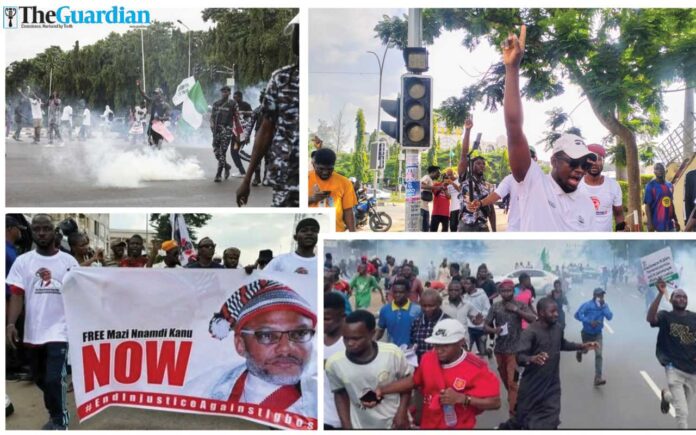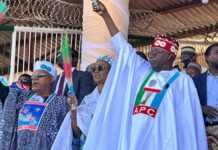Reuben Abati
Yesterday was October 20, the fifth anniversary of the Lekki Toll Gate Massacre, aftermath of the #EndSARS youth protest in Lagos. Scores of young persons were reportedly killed, maimed, made to inhale tear gas, or jump into the Lagoon and till date there has been no full closure on that event, despite attempts by the Federal and state governments to investigate what exactly happened, and make some form of restitution in some of the states. It was the equivalent of a Gen Z protest in Nigeria, an expression of youth affirmation and protest, similar to what has now happened in Nepal in September 2025. In Nepal, angry youths practically removed a government from office after protesting over social media ban and government corruption. The Prime Minister, KP Sharma Oli had to step down. Other government officials fled. Those who tarried were humiliated. There have been similar protests by young people in recent times in Madagascar, Peru, and Morocco. As in Nepal, the government in Madagascar was also toppled, providing an opportunity for the military to seize power, yet another major setback for democracy in the continent.
In the face of these youth-led protests in Africa, Asia and South America, the governments are frightened. The issues may differ: police violence and misconduct in Nigeria, social media ban and corruption in Nepal, economic disempowerment in Bangladesh in 2024, misplaced priorities, need for social services reforms as stated by the GENZ212 movement in Morocco, tax bill and cost of living crisis in Kenya, election issues, inequality, corruption in Mozambique in the words of GENZ Mozambique, and demand for better wages and pensions in Peru. A common denominator is the rise of youth power, and the determination by young people who constitute the majority of the populations in Africa, Asia and South America seeking to take charge of their own destinies, and demand the exit of non-performing governments. They ask for transparency, accountability, good governance, reforms and change. They come across as leaderless, a movement using both their voices and technology to get heard, and reject traditional political systems. In Nigeria, the slogan was “Sorosoke” (speak out loud and be heard), Moroccan youths used their country’s international dialling code: 212. The youths of the world seem to be taking cues from each other, inspiring a wave of global protests. They remind us afresh of Occupy Wall Street in 2011, the Arab Spring in 2010 -2012; the Umbrella Revolution in Hong Kong in 2014, and the all-dominating power of social media.
Are the leaders listening, frightened as they appear to be? Not quite. In Peru, one person died, 100 were injured; 72 persons were killed in Nepal in September, persons also died in Morocco (more than 3) and Mozambique (more than 33 killed, 15 injured) and in Madagascar, more than 22 persons were killed. The standard response of the incumbent authoritarian governments is to meet the people’s revolt with accustomed high-handedness. This raises concerns about the destiny of democracy and the fortunes of leadership and governance in otherwise representative systems.
Our main concern is how the emerging global trend is all too present and alive in Nigeria. The state either in Peru, Madagascar, Lagos or Abuja acts out of fear. In Lagos, to mark the fifth anniversary of #EndSARS alleged massacre in Lagos (please note that the word alleged is used allegedly), Opeyemi Adamolekun, a seasoned civil society activist who runs an active group known as Enough is Enough (EiE), yesterday had brought a bouquet of flowers to lay as a wreath at the Lekki Toll Gate in memory of those who fell at that location in 2000. Security operatives harassed her, and asked not to lay any wreath. No flowers. She was not carrying any weapon. Just flowers. But the state operatives of Nigeria were afraid of ordinary bush shrubs. What could have been frightening about ordinary flowers? The state is so scared it cannot even deal with ordinary symbolism. They pushed the poor lady. They asked her to get lost with her flowers. Flowers oh. The assailants wore brown uniform. There are so many agencies whose officials wear all kinds of uniforms in Nigeria, it is difficult to keep count or know their true identity. Can someone please help? Have they created an anti-flower bearing squad in Lagos? What part of state law makes it a crime to hold flowers on the streets of Lagos? They grabbed the flowers from Adamolekun and shared among themselves. Did they think the leaves would make good addition to their wives’ pots of soup? It is a crazy country, and the people in uniform are the most afflicted. They are victims themselves. They are poorly and rarely paid. When they retire, they rarely receive their pensions, but the moment they wear that uniform of whatever colour, their quick instinct is to oppress their fellow citizens.
The same drama played out in Abuja yesterday at the protest summoned by Omoyele Sowore, the 2023 Presidential candidate of the African Action Congress (AAC). Sowore is a professional civil society activist and pro-democracy campaigner. In the past week, he had tried to mobilise all categories of citizens to come forward to campaign for the release of Mazi Nnamdi Kanu – the detained leader of the Indigenous People of Biafra (IPOB) who has been standing trial since 2015, for criminal charges relating to terrorism, treason, defamation, and conspiracy to commit violence. He was released from detention in 2017, and was later re-arrested in Kenya in June 2021 by Interpol and extradited to Nigeria. He has been in state custody since then. He was accused of jumping bail. Sowore wants him released: #ReleaseNnamdiKanu. His plan was to put one million people on the streets of Abuja on Monday, October 20, to protest from the Transcorp Hilton, the convergence point, to be joined by “all online protesters, activists, citizens, and allies everywhere to turn every platform into a space for truth and resistance”.
In a tone reminiscent of the youth rebellion in Nepal, Sowore wrote: “From today, the internet becomes our rally ground, a united digital front for freedom and conscience. We are online, we are everywhere, and we are unstoppable”. Those words are ominous. A week ago, Sowore had announced that he had the consent of prominent national figures such as former Vice President Atiku Abubakar, President Goodluck Jonathan, Femi Falana SAN, and Senator Shehu Sani. He also called on South East leaders: Mr. Peter Obi, and the Governors – bCharles Chukwuma Soludo (Anambra) Alex Otti (Abia), Francis Nwifuru (Ebonyi) Peter Mbah (Enugu), Hope Uzodinnma (Imo), Ndigbo in general and other voices of conscience. He asked Igbo leaders and others to turn rhetoric into action. Yesterday, the protest held. As early as 6.30 am, the protesters had trooped onto the streets of Abuja: the Three Arms Zone, Transcorp Hilton, Jabi and elsewhere, they were out in their numbers.
Nobody sighted any prominent Nigerian among the protesters, but Aloy Ejimakor, Kanu’s counsel was among them. Mr. Bayo Onanuga, Presidential Spokesperson, has complained about the ugliness of a lawyer who is representing his client in a pending matter in a court of law also resorting to self-help on the streets. It is indeed an infamous act of a high proportion, and the whole exercise, by that objective fact alone, would seem like an attempt to intimidate and overwhelm the court. Nnamdi Kanu has an on-going case at the Federal High Court in Abuja. The Court of Justice James Omotoso had ruled, most recently that Kanu has a case to answer in response to a “No Case application” by his lawyers; on the basis of which his trial is scheduled to begin on Thursday. On the surface of it therefore, the judicial process in the matter has not been exhausted. But this is also what makes the matter delicate and complicated. There is an even an international dimension. Nigeria has a Mutual Legal Assistance pact with other countries including Finland where Simon Ekpa, associated with the Kanu charges has now been convicted. Should Nigeria abort the trial of Kanu, midway, on the basis of street sentiments?
The state security services felt obliged to defend the city of Abuja against the protesters. They barricaded the streets and unleashed cannisters of tear gas on the protesters, It has even been reported that when that was not enough, they resorted to live bullets. The protesters ran so fast in all directions, many of them lost their footwears. Abuja residents became hostages in their own city. Vehicular movement and businesses were affected. It must be re-emphasised that the right to protest, the right to assemble and the right to express an opinion are constitutional rights. The expression of those rights should not be met with bullets. By the same token, however, the same rights should be exercised within the bounds of reason and sanity. The protesters reportedly called for revolution and change. At this time, there had been speculations about the threat of coup-making, coup-thinking in Nigeria. This then would seem like the very wrong time to suggest anything remotely revolutionary. Nonetheless, that would not justify the excessive use of force even as dire as the situation in the Federal Capital Territory may have been: the 5th anniversary of #EndSARS and the #FreeNnamdiKanu protest, both converging as potent threats to the seat of government on the same day. There were no open protests elsewhere, but the entire South East was quiet. In Abia, Ebonyi, Enugu, Anambra, and Imo, the markets were closed. People stayed at home. In Abuja, the police harassed the protesters and arrested many, including journalists. Journalists do not deserve to be demonized, harassed or punished for doing their work. They should be released immediately. The protesters should be allowed to go too: non-violent protest is not a crime and there is nowhere in the books where a peaceful protest is a threat to the state. The security agencies can claim that they did not want a blow out, and having achieved that, they should allow the detained persons to go.
Two more things. The first is that there is a touch of irony to the Sowore-inspired protest. Sowore is an Ilaje Yoruba man, Arogbo-Ijaw from Ondo State. In this country, the politics of ethnicity and regionalism is at the heart of almost every relationship. His involvement in the Kanu struggle shows that the struggle for justice is above ethnic or regional considerations. It also exposes the contradictions at the heart of Igbo politics and the hypocrisy of the Igbo leadership elite. On the Nnamdi Kanu question, Igbo leaders are very good at diplomacy and rhetoric, none of them will ever dare identify pro-actively with Sowore’s revolutionary tactics. They would rather toe the line that I had identified earlier: that Nigeria has an obligation not to be seen to be sabotaging a live judicial process, or supporting mob action to truncate a judicial process. The court says Nnamdi Kanu has a case to answer, and that he is healthy enough to stand trial: Would it not be a better idea to wait for the process to run its course and then insist on Presidential pardon subsequently?
Secondly, this in itself is a proposal that many would pooh-pooh because we have reached a point in this country where nobody, including those running the same government, trusts government anymore. This is borne out of the haphazard manner in which government is run. In the days to come, the Tinubu administration is likely to be reminded that the argument about legal process and international legal co-operation cannot stand coming from a government that has just pardoned or commuted the prison sentences of 175 persons in line with Section 175 of the 1999 Constitution. The correlation between the number of pardoned persons and the actual section of the law shows a curious juvenile reasoning behind the exercise, made worse by the fact that most of the persons on the list are convicted murderers, drug traffickers, kidnappers, drug addicts, economic saboteurs and human rights criminals. President Tinubu is therefore confronted with a moral question: why not Nnamdi Kanu, since this is a season of clemency, and he, the President has the powers within the Constitution to turn black into white, and make persons whole again? This is the urgent question of the moment in the eyes of Sowore and his band of protesters. But they may have to wait till sometime close to the 2027 general elections when President Tinubu may decide to use the Kanu matter as a potent political game changer in Nigeria’s game of chess and opportunism.
ThisDay






























































